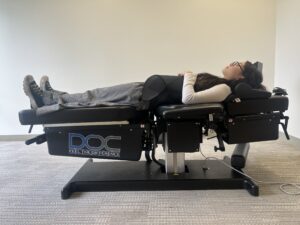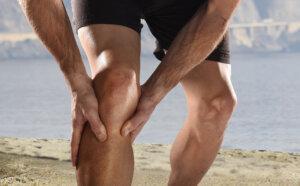Do you experience tingling, numbness, burning, or sharp pains in your feet? These could be signs of neuropathy, a condition that affects the peripheral nerves. Neuropathy feet symptoms can range from mild to severe and impact your quality of life.

At TruSpine Chiropractic, our experienced team specializes in providing drug-free, non-surgical treatments for neuropathy, including chiropractic care, acupuncture, and innovative therapies like shockwave and laser therapy. In this comprehensive guide, we’ll delve into the causes, symptoms, and available treatments for neuropathy feet symptoms.
Key Takeaways
- Neuropathy is a condition that affects the peripheral nerves, often causing symptoms in the feet like tingling, numbness, burning, and pain.
- Common causes include diabetes, vitamin deficiencies, autoimmune disorders, and certain medications.
- Chiropractic care, acupuncture, and therapies like shockwave and laser treatment can provide natural, drug-free relief for neuropathy feet symptoms.
- Making lifestyle changes like managing blood sugar, eating a nutritious diet, and exercising regularly can help prevent or slow the progression of neuropathy.
Additional reading: Nerve Pain: Your Body’s Alarm System
Symptoms of Neuropathy in the Feet
Neuropathy feet symptoms can develop gradually over time or come on suddenly. They may affect both feet simultaneously and can range in severity. Common signs and symptoms include:
- Tingling or numbness in the toes or feet
- Burning, sharp, or stabbing pains
- Feeling like you’re wearing socks or gloves when you’re not
- Sensitivity to touch
- Muscle weakness or paralysis
- Lack of coordination or balance issues
- Foot drop (inability to lift the front part of the foot)
- Changes in skin, hair, or nails
These symptoms can make it difficult to walk, stand for long periods, or perform daily activities. If left untreated, neuropathy can lead to serious complications like skin ulcers, infections, and even amputation in severe cases.
Causes and Risk Factors
There are many potential causes of peripheral neuropathy that can lead to feet symptoms. Some of the most common include:
- Diabetes: High blood sugar levels can damage nerves over time
- Vitamin deficiencies: Low levels of B vitamins, especially B12, can affect nerve health
- Autoimmune disorders: Conditions like rheumatoid arthritis and lupus can cause inflammation that damages nerves
- Infections: Certain viral or bacterial infections like shingles, Epstein-Barr, and Lyme disease
- Toxins: Exposure to heavy metals, industrial chemicals, and certain medications
- Inherited disorders: Some genetic disorders can affect nerve function
- Trauma or pressure: Injuries, falls, or repetitive motions that put pressure on nerves
Other risk factors that can increase your likelihood of developing neuropathy include:
- Older age
- Family history
- Alcohol abuse
- Smoking
- Kidney disease
- Exposure to toxins
The Early Signs and Progression of Neuropathy in the Feet
Neuropathy in the feet often develops gradually, with subtle symptoms that may be easily overlooked in the early stages. Being aware of these early signs can help you seek timely medical attention and prevent the progression of nerve damage.
Early symptoms of neuropathy in the feet may include:
- Mild tingling or numbness in the toes or balls of the feet
- Intermittent sensations that come and go or occur after prolonged standing or walking
- Burning, sharp, or shooting pains in the feet, especially at night
- Increased sensitivity to touch, making even light pressure from socks or bedsheets uncomfortable
As neuropathy progresses, the symptoms may become more constant and severe:
| Progression Stage | Symptoms |
|---|---|
| Intermediate | Constant tingling and numbness extending to the entire foot or leg Decreased ability to feel pain or temperature changes in the feet Increased risk of injuries like cuts, blisters, or burns |
| Advanced | Muscle weakness or cramping in the feet and legs Difficulty walking and balance issues Higher risk of fallsFoot deformities like bunions, hammertoes, or Charcot foot |
It’s essential to seek medical attention if you notice any symptoms of neuropathy in your feet. Early diagnosis and treatment can help:
- Slow the progression of nerve damage
- Prevent serious complications
- Manage symptoms effectively
- Maintain foot health and overall well-being
Neuropathy in the Feet
As neuropathy in the feet progresses, the symptoms can become more severe and debilitating. Advanced neuropathy can significantly impact your quality of life and lead to serious complications if left untreated. It’s crucial to be aware of these advanced symptoms and seek prompt medical attention to prevent further damage and maintain your foot health.
Symptoms and Progression
Advanced symptoms of neuropathy in the feet may include:
- Constant, severe pain that interferes with daily activities
- Complete loss of sensation in the feet
- Weakness and muscle atrophy in the feet and legs
- Difficulty walking, balance problems, and frequent falls
- Foot deformities and changes in foot shape
The progression of neuropathy can lead to various complications, which can be categorized as follows:
| Complication | Description |
|---|---|
| Foot Ulcers | Open sores that develop due to lack of sensation and repeated pressure on the feetIncreased risk of infection, which can spread to the bone (osteomyelitis)Slow healing process due to poor circulation |
| Charcot Foot | Weakening and destruction of foot bones and jointsFoot deformities, such as collapsed arches or rocker-bottom appearanceIncreased risk of fractures and dislocations |
| Amputation | Removal of a toe, foot, or part of the leg due to severe infections or non-healing woundsLast resort treatment option when other interventions have failedSignificant impact on mobility and quality of life |
Treatment Plans
To prevent these serious complications, it’s essential to follow a comprehensive treatment plan that addresses the underlying cause of neuropathy and manages the symptoms. Treatment options for advanced neuropathy may include:
- Pain management with medications, such as antidepressants, anticonvulsants, or opioids
- Nerve stimulation therapies, like transcutaneous electrical nerve stimulation (TENS) or spinal cord stimulation
- Physical therapy and rehabilitation to improve strength, balance, and mobility
- Custom orthotic devices or specialized footwear to redistribute pressure and prevent foot ulcers
- Wound care and infection management for foot ulcers
- Surgical interventions, such as nerve decompression or Charcot foot reconstruction
In addition to medical treatment, lifestyle modifications play a critical role in managing advanced neuropathy:
| Lifestyle Modification | Benefit |
|---|---|
| Blood Sugar Control | Maintaining stable blood sugar levels can slow the progression of diabetic neuropathy |
| Healthy Diet | Eating a balanced diet rich in vitamins and nutrients can support nerve health |
| Regular Exercise | Engaging in low-impact activities like swimming or cycling can improve circulation and reduce neuropathy symptoms |
| Foot Care Routine | Daily foot inspections, proper hygiene, and moisturizing can prevent infections and ulcers |
Treatment Options for Neuropathy Feet Symptoms
At TruSpine Chiropractic, we offer a range of natural, non-invasive treatments to help alleviate neuropathy feet symptoms and promote nerve healing. Our personalized treatment plans may include:
Chiropractic Care
Chiropractic adjustments can help relieve pressure on compressed nerves, improve circulation, and reduce inflammation. Gentle manipulations to the feet, ankles, and lower legs can help restore proper alignment and reduce neuropathy symptoms.
Acupuncture
Acupuncture involves the insertion of thin needles into specific points on the body to stimulate healing. It can help reduce pain, improve nerve function, and increase blood flow to the feet. Regular acupuncture sessions may help manage neuropathy symptoms and prevent progression.
Laser Therapy
Laser therapy uses focused light energy to penetrate deep into tissues and stimulate cellular repair. It can help reduce inflammation, alleviate pain, and promote nerve regeneration. Laser treatments are painless and have no side effects.
Shockwave Therapy
Shockwave therapy uses high-energy sound waves to stimulate healing in damaged tissues. It can help reduce pain, increase circulation, and promote nerve repair. This non-invasive treatment is performed right in our office and requires no downtime.
In addition to these therapies, we may recommend lifestyle modifications to help manage neuropathy feet symptoms:
- Manage blood sugar levels if you have diabetes
- Eat a healthy diet rich in B vitamins and antioxidants
- Exercise regularly to improve circulation and maintain muscle strength
- Avoid alcohol and smoking
- Practice good foot care like wearing comfortable shoes, checking your feet daily for injuries, and keeping them clean and moisturized
Preventing Neuropathy Progression
While not all cases of neuropathy can be prevented, there are steps you can take to reduce your risk or slow the progression of symptoms:
- Control underlying conditions like diabetes, autoimmune disorders, or infections
- Eat a balanced diet and consider supplements for vitamin deficiencies
- Avoid repetitive motions or positions that put pressure on nerves
- Protect your feet from injuries by wearing proper footwear
- Avoid exposure to toxins and limit alcohol intake
- Stay physically active and maintain a healthy weight
When to Seek Medical Care
If you experience any symptoms of neuropathy in your feet, it’s important to see a healthcare provider as soon as possible. Early diagnosis and treatment can help prevent complications and improve outcomes.
Seek immediate medical attention if you have:
- Severe pain or weakness
- Sudden loss of sensation
- Open sores or injuries on your feet
- Signs of infection like redness, swelling, or fever
Conclusion
Neuropathy feet symptoms can be debilitating and impact your quality of life. At TruSpine Chiropractic, we understand the challenges of living with neuropathy and are here to help. Our team of experienced providers offers compassionate, individualized care to alleviate your symptoms and promote nerve healing.
If you’re experiencing tingling, numbness, burning, or pain in your feet, don’t wait to seek treatment. You can schedule a consultation by either by calling us at 415-421-1115 or booking online and take the first step towards relief. Together, we can create a comprehensive treatment plan to help you regain your mobility and live your best life.




